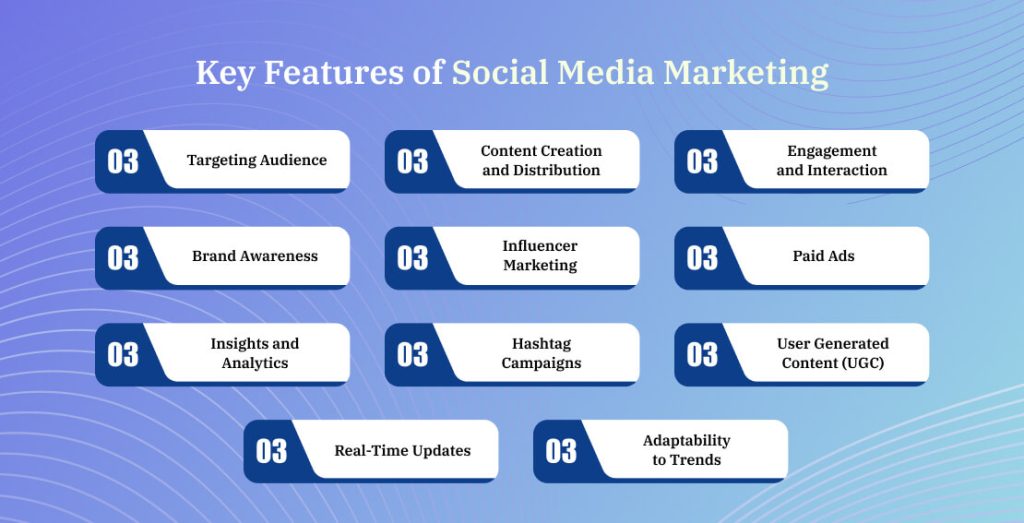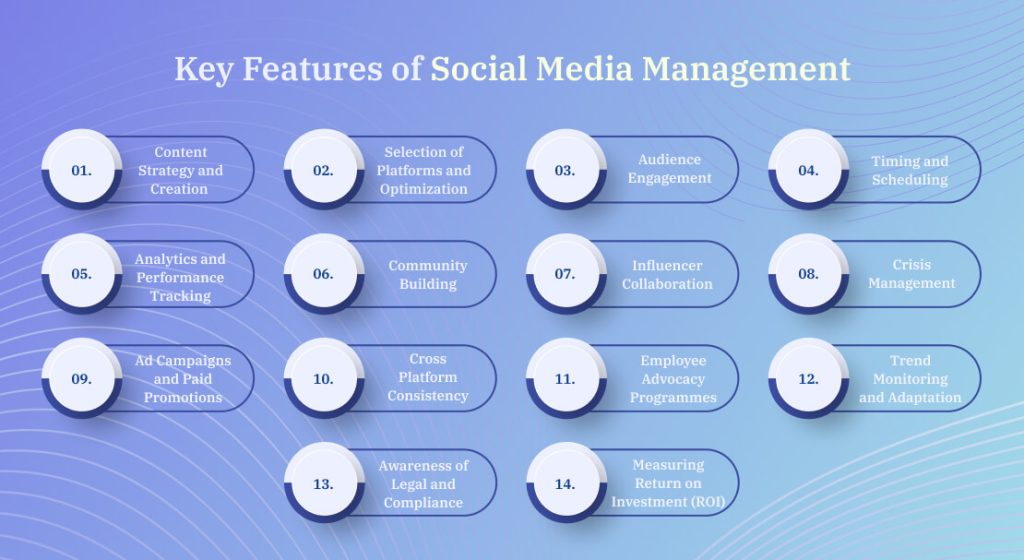Social Media Marketing and Management are distinct fields in the rapidly evolving digital communications landscape. Each has its own unique goals and strategies.
SMM marketing refers to strategically using social media platforms to reach specific business goals. It emphasizes campaigns, external reach, and analytics. The focus is creating engaging content, using paid advertising, and working with influencers to increase brand awareness, lead generation, and conversions.
Social Media Management, on the other hand, is the daily orchestration of the social presence of a company, with a focus on community building, consistency, and relationship management. This involves content curation and long-term audience cultivation. It also includes real-time interaction.
Both are essential components in a social media strategy but have different primary activities and focuses. This blog explores the critical distinctions between Social Media Marketing and Management. It sheds light on the roles of these two pillars as they navigate the digital landscape.
What is Social Media Marketing?
Social Media Marketing is a strategy for digital marketing that utilizes social media to market products, brands, and services. This involves sharing and creating content for social networks like Facebook, Instagram, and Twitter to reach a targeted audience. It is primarily a way to increase brand recognition, website traffic, and customer engagement.
SMM includes various activities, including creating and curating content, paid advertisements, and engagement with followers via comments and messages. Social media’s virality increases a brand’s visibility and reach. Social media offers an effective platform to foster client relationships, gain insights into client tastes and preferences, and drive sales.
SMM works best when your target audience and platforms are fully understood. You also need to create compelling content that fits the unique characteristics of each platform. Social media’s real-time capabilities allow businesses to adapt to consumer trends quickly, and it is a powerful component in modern marketing.
Key Features of Social Media Marketing

Social media marketing has many key characteristics that make it effective.
Targeting Audience
Social media platforms offer sophisticated targeting capabilities, which allow marketers to target specific demographics and interests. The precision of audience targeting increases the likelihood that the marketing message will be delivered to the correct people and increases the chance for engagement.
Content Creation and Distribution
Social media marketing relies heavily on distributing and creating different content types. Text posts, photos, videos, infographics, and other content types are all included. Content that is tailored to audience preferences helps to maintain interest and engagement.
Engagement and Interaction
The social media platform is a two-way communication medium for brands and audiences. Engagement with your followers via comments, likes, shares, and direct messages builds a stronger sense of community. The interaction humanizes your brand and makes it relatable.
Brand Awareness
Social media’s power to build brand awareness is immense. A brand’s image can be maintained by posting regularly and strategically. Social media profiles can reinforce visual elements such as brand colors and logos, resulting in a consistent brand image.
Influencer Marketing
Many social media platforms are home to influencers with a significant following and influence within a specific niche. Collaboration with influencers allows brands to leverage the credibility of their next and tap into it. Influencer marketing is a great way to extend a brand’s reach and increase its credibility with a specific audience.
Paid Ads
The social media platforms provide a wide range of social media advertising services opportunities, which allows marketers to reach a larger audience. Sponsored posts, video ads, and display ads are all paid advertising options. Demographics, online behavior, and interests can target them. This ensures that your marketing budget is used effectively.
Insights and Analytics
Analytics tools on social media provide valuable insight into marketing performance. Marketers can monitor metrics like engagement, reach, and click-through rate. These metrics can refine campaigns, determine successful tactics, and improve future campaigns.
Hashtag Campaigns
Hashtags are essential for organizing and classifying content in social media. To encourage the creation of user-generated material and campaign participation, brands often promote and create branded hashtags. Hashtag campaigns are a great way to increase brand awareness and engagement.
User Generated Content (UGC)
The SMM social media marketing strategies that encourage users to share and create content about the brand are powerful. The user-generated content acts as a testimonial and endorsement, building trust with potential clients. Brands can showcase UGC through stories, reposts, or highlight reels.
Real-Time Updates
The social media platform allows for instant communication. Brands can share real-time updates, news, announcements, and other information with their audiences. Real-time updates are beneficial during product launches or events.
Adaptability to Trends
The social media landscape and the features that are available on it are constantly changing. Marketers must stay current on the latest social media trends and features, including new platforms, content formats, and emerging social media behavior. Adapting to trends is critical for brands to remain relevant.
Understanding Social Media Management
Social media management involves optimizing the online presence and managing it across different platforms. The role is multifaceted and includes curating and scheduling content and engaging the audience via comments, messages, and interactions.
They develop and implement strategies that increase brand awareness, encourage engagement, and achieve marketing goals. Analytics tools allow managers and executives to track performance metrics. They can also refine their strategies using data. Social media management also includes crisis management, reputation management, and keeping up with platform updates.
SMMgt is a complex task that requires creativity, strategic planning, and an in-depth understanding of your target audience. It plays a vital role in promoting brand loyalty and community.
Key Features of Social Media Management

Here are some of the most essential features that make social media effective.
Content Strategy and Creation
Content Marketing strategy is the first step in social media management. It involves creating and planning content in line with the brand’s identity that resonates well with your target audience. Text posts, photos, videos, infographics, and other content can be used. Content that is consistent, well-planned, and thought-out will help maintain interest in your audience and keep them engaged.
Selection of Platforms and Optimization
Social media platforms are tailored to accommodate diverse audiences and content types. The SMM marketing agency must choose platforms carefully based on target demographics and business goals. Optimizing involves using relevant keywords and creating compelling profiles.
Audience Engagement
Engaging with your audience is part of social media management. In addition to strengthening relationships, responding to messages, comments, and mentions can help build community. The social media manager is the face of the company, answering questions, acknowledging words, and creating a positive environment online.
Timing and Scheduling
Social media management is all about timing. Knowing when your target audience will be most active ensures you reach a larger audience. Social media managers use schedulers to automate and plan posts. This optimizes the timing of each post for maximum engagement and visibility.
Analytics and Performance Tracking
Social media managers use analytics tools to monitor the effectiveness of campaigns and content. Insights can be gained from engagement, reach, click-through rate, and conversion rates. Social media managers can refine their strategies by analyzing the data. They can also identify effective tactics and optimize future content to achieve specific goals.
Community Building
To build a brand community, followers must be able to interact with one another and the brand. Social media managers encourage discussions, host events, and promote user-generated material to foster community loyalty.
Influencer Collaboration
Influencers and social media managers work together to increase a brand’s visibility. With their large audience and established credibility, influencers can effectively promote services or products. Social media managers engage relevant influencers and negotiate partnerships. They also oversee influencer marketing campaigns.
Crisis Management
Social media managers must be ready for crises on social media. Be it negative feedback, public relations problems, or backlashes on the network, effective crisis management requires timely responses with transparency as part of an overall plan to help protect brand integrity and preserve reputational gains.
Ad Campaigns and Paid Promotions
Social media advertising can help reach an expansive target market. Managers of social media plan and implement paid campaigns that target specific demographics while optimizing the ad budget. Brands can use this feature to boost their visibility, increase website traffic, and create leads.
Cross Platform Consistency
Maintaining a consistent image of your brand across all social media platforms is essential. The social media manager ensures that all branding elements, such as colors, logos, and messages, are uniform. Consistency reinforces brand identity and allows followers to recognize the brand easily.
Employee Advocacy Programmes
Encouraging employees to become brand advocates via social media will increase reach and credibility. Social media managers create and implement employee advocacy programs, providing resources and guidelines to encourage employees to share updates about the company, its achievements, and its culture through their profiles.
Trend Monitoring and Adaptation
The social media landscape and the features that are available on it are constantly changing. Social media managers are always informed of industry trends, platform updates, and user behavior changes. They can then adapt their strategies to incorporate new features and exploit emerging trends.
Awareness of Legal and Compliance
Managers of social media platforms must understand legal considerations and comply with them, such as privacy laws, copyright concerns, and guidelines specific to each platform. By ensuring that campaigns and content adhere to legal procedures, brands can avoid legal issues and maintain their reputation.
Measuring Return on Investment (ROI)
Measuring ROI is essential to demonstrating the effectiveness of social media. SMM Services USA uses key performance indicators and analytics to track and quantify campaign results, conversions, and the contribution of the entire social media strategy to an organization’s overall goals.
Social Media Marketing vs. Social Media Management: Key Difference
Social media marketing and management may look similar; they both involve planning and creating content to post on social media and improving your business and brand. Some key differences between the two make it logical to use each separately.
Social media management focuses on content, voice, and the growth of the commercial image. This is similar to giving your physical store an upgrade and maintaining it. This is important, but it will only sometimes increase sales.
On the other hand, social media marketing aims to sell your brand in the best way possible. To achieve this goal, a digital marketer will analyze data, metrics, and your business. They can then decide on the best way to achieve a specific marketing goal.
Other minor differences exist between the two. Ads are a vital part of social media marketing. Social media management is different. Focus on the “voice” of your brand and its message.
The main differences between the two are apparent. The first focuses on using the account, while the second focuses on maintaining and selling an online presence. It’s as simple as this.
Conclusion
Social Media Marketing and Management differ in their primary objectives, timelines, and focus. SMM is a campaign-oriented marketing strategy that strives to reach specific goals, such as brand recognition, lead generation, and conversion. The SMM uses paid advertising, influencer collaborations, and analytics to achieve measurable results.
SMMgt, on the other hand, is a long-term, ongoing effort that focuses on building and maintaining a brand’s online presence. The emphasis is on community building, brand consistency, and managing customer relationships. The social media manager focuses on creating content and engaging with audiences in real time to maintain relationships.
SMM and SMMgt have distinct functions, but integration is essential for a social media strategy. The synergy between ongoing management and marketing campaigns is vital to ensure consistency and maximize audience engagement. This leads to short-term and long-term success for brands. A harmonious balance of these two factors creates an effective and robust social media presence.
